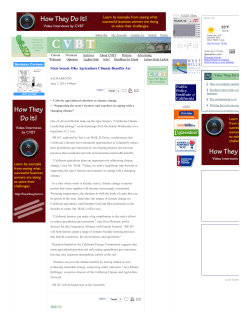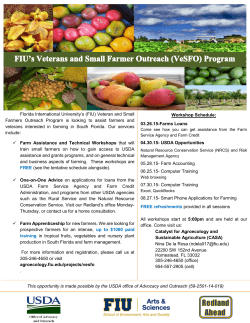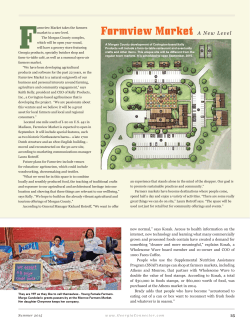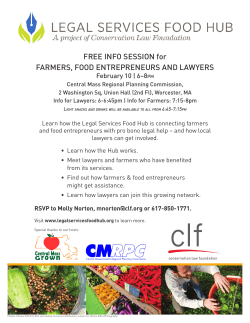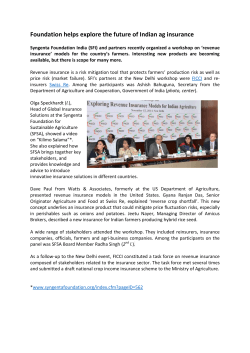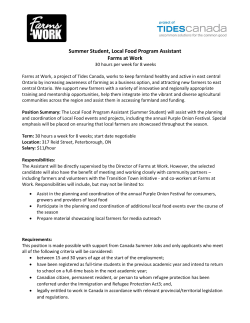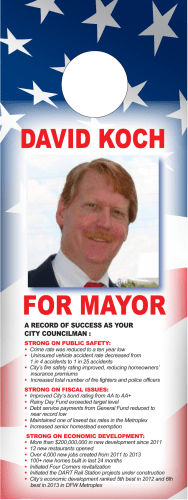
Farmers Market Guidelines - Flathead City
Farmers’ Market Guidelines This guideline is intended for use by local sanitarians and farmers’ market managers to help answer questions and provide guidance for the operation of farmers’ markets. Revised May 2015* *This guide valid until September 30, 2015. *New guidelines incorporating changes to the Montana Code Annotated based on the passage of HB 478 by the 2015 Montana Legislature will go into effect after that date. State law defines Farmers’ Markets as “a farm premises, a roadside stand owned and operated by a farmer, or an organized market authorized by the appropriate municipal or county authority” [50-50102(5)], MCA. 50-50-202(3), MCA provides for the exemption from licensure as a Retail Food Establishment for the following: 50-50-202. Establishments exempt from license requirement -- farmers’ market records. (3) (a) (i) A license is not required of a gardener, apiarist, farm owner, or farm operator who sells raw and unprocessed farm products or whole shell eggs at a farmers’ market. (ii) Whole shell eggs sold at a farmers’ market by a farm owner or operator must: (A) be clean, free of cracks, and stored in clean cartons; (B) be kept at a temperature established by the department; and (C) carry a label indicating the name and address of the farm owner or operator selling the eggs. (b) A license is not required of a person: (i) selling or offering hot coffee or hot tea at a farmers’ market; or (ii) selling baked goods or preserves at a farmers’ market or exclusively for a charitable community purpose. (c) Coffee or tea exempted under this subsection (3) may not be prepared or served with fresh milk or cream. (4) (a) A farmers’ market that is an organized market authorized by a municipal or county authority shall keep registration records of all individuals and organizations that sell baked goods or preserves at the market. (b) The registration records must include but are not limited to the name of the seller, the seller's address and telephone number, the products sold by the seller, and the date the products were sold. (c) The registration records must be made available to the local health officer or the officer's agent. Raw and unprocessed farm products are defined in 50-50-102(16) as: (a)“raw honey that: (i) is not combined with other food products; and (ii) if packaged, is packaged in a clean container with a label; or (b) “fruits, vegetables, and grains sold at a farmers’ market in their natural state that are not packaged and labeled and are not: (i) cooked; (ii) canned; (iii) preserved, except for drying; (iv) combined with other food products; or (v) peeled, diced, cut, blanched, or otherwise subjected to value-adding procedures.” Baked goods are defined in 50-50-102(1) as “breads, cakes, candies, cookies, pastries, and pies that are not potentially hazardous foods.” Preserves are defined in 50-50-102(15) as “processed fruit or berry jams, jellies, compotes, fruit butters, marmalades, chutneys, fruit aspics, fruit syrups, or similar products that have a hydrogen ion concentration (pH) of 4.6 or below when measured at 24 degrees C (75 degrees F) and that are aseptically processed, packaged, and sealed.” Other food items offered at Farmers’ Markets are required to be approved and licensed as a Retail Food Establishment. Contact your county sanitarian for more information on the requirements for licensure. IN SUMMARY: Only products that qualify as “Raw and unprocessed farm products”, “Baked goods”, and “Preserves”, “Farm eggs” and “Hot coffee and Hot tea” can be sold at a ‘Farmers’ market’ without a license from DPHHS. Wild morel mushrooms do not qualify as an exempted product. Other food items offered at farmers’ markets are required to be approved and licensed by DPHHS. Contact your county sanitarian for more information on the requirements for licensure. FREQUENTLY ASKED QUESTIONS: 1. Question: Are Salsas, Pickles, Salad Dressings, Herb-in-Oil/Vinegar Mixtures, Sauerkraut, Pepper Jelly, etc, considered to be “Preserves” and exempt from licensure for sales at farmers’ markets? Answer: None of the products meet the definition of “Preserves” as defined in 50-50-102, MCA. They are required to be processed in a locally approved and licensed facility to sell products anywhere, including at a farmers’ market. Retail licensure may not be required of a known or licensed wholesale firm distributing shelf-stable/non-perishable products at retail. 2. Question: Are Cream Puffs, Cream Pies, Pumpkin Pies, Custard Pies, Cream or Pudding Filled Pastries, cheesecakes, cheese breads considered “Baked goods” and exempt from licensure for sales at farmers’ markets? Answer: None of these products meet the definition of exempt “Baked goods”. All of these products would be considered to be “Time and Temperature Controlled for Safety foods” as defined in state statute, and as such would require local approval and DPHHS licensure to distribute these products at farmers’ markets. 3. Question: I want to sell my processed Poultry/Meats at a farmers’ market. What do I need to do? Answer: A retail food license is required to distribute these types of products at farmers’ markets. It is recommended that you contact the state Department of Livestock Meat Inspection Bureau first to find out their requirements for slaughter and processing, and then contact your local sanitarian to receive information on their requirements to become a licensed retail meat market. 4. Question: May I sell huckleberries at a farmers’ market without a license from DPHHS? Answer: Yes, as long as they are not processed. They fall under the category of “Raw and unprocessed farm products”.
© Copyright 2025
